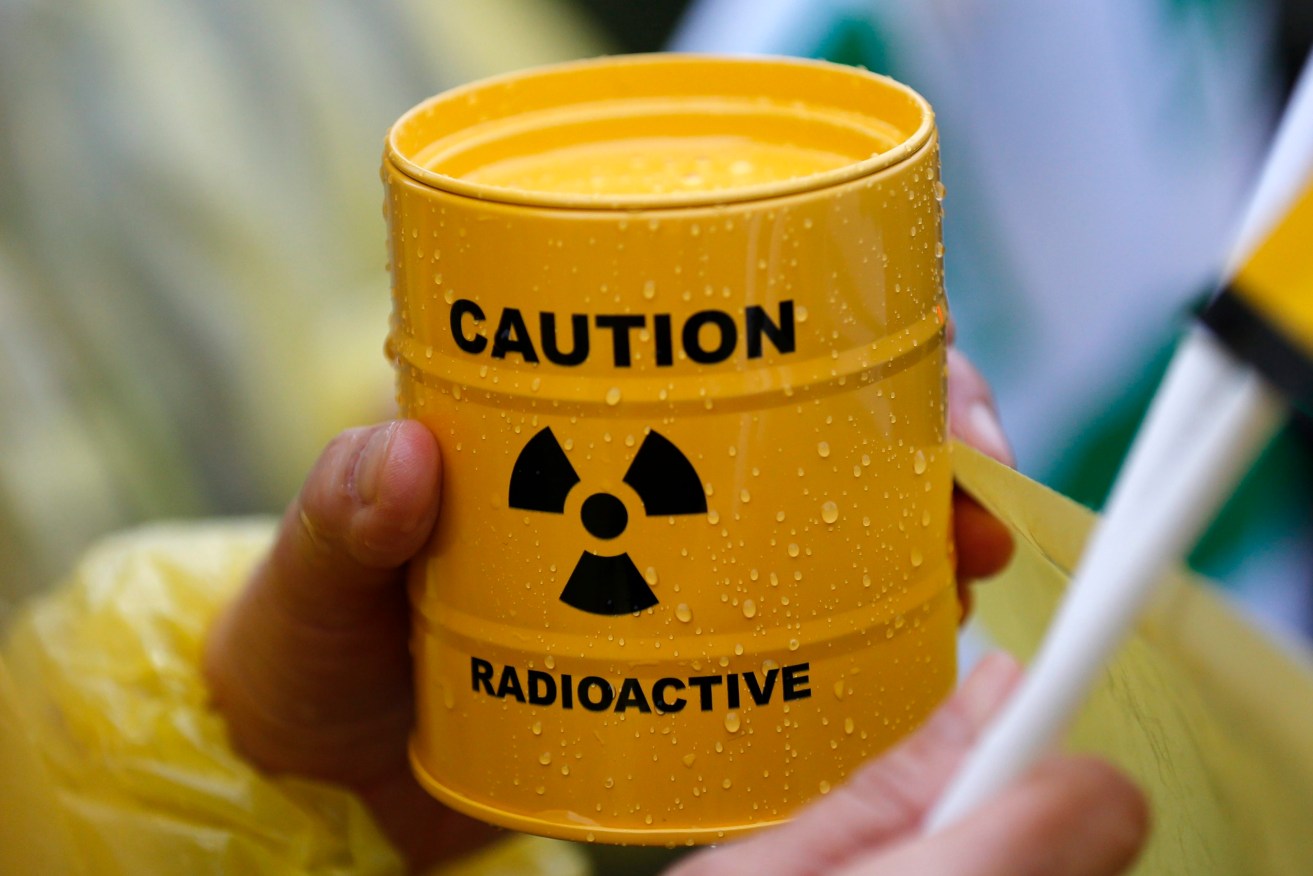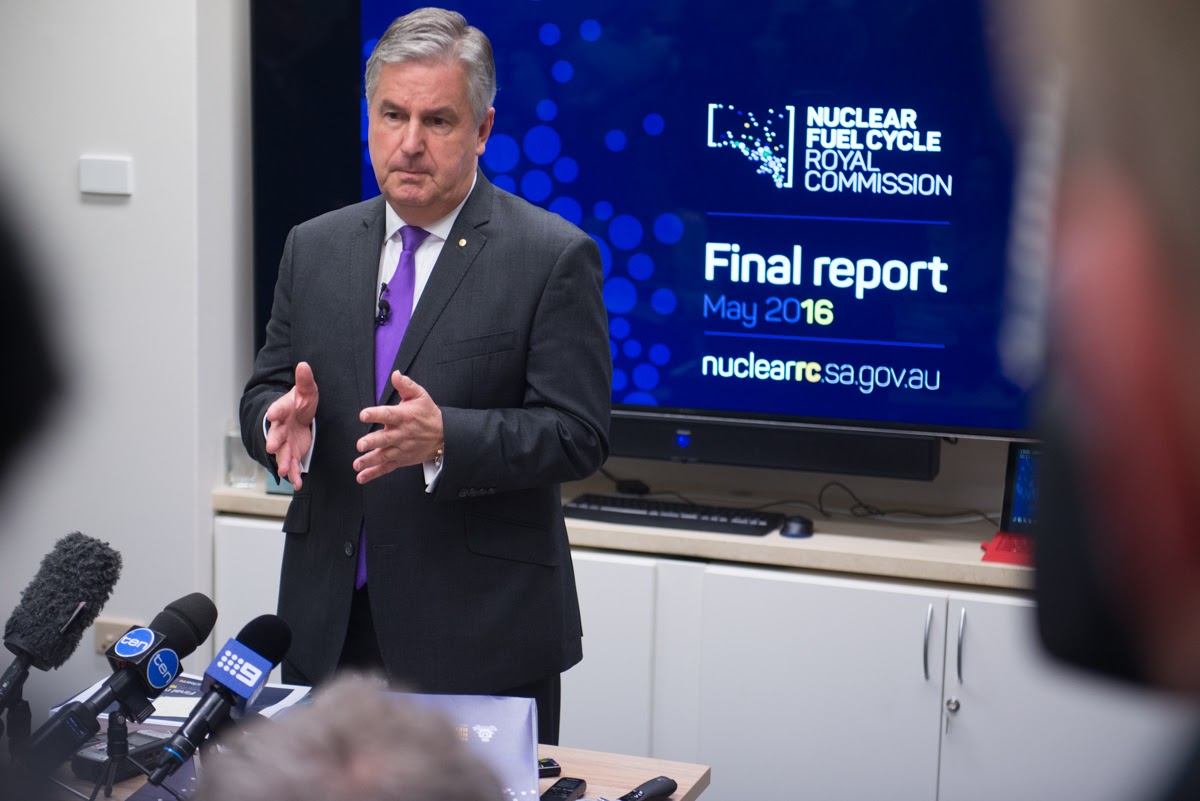The political and moral case for storing the world’s nuclear waste
Political scientist Haydon Manning hits back at economic critiques of SA’s proposed nuclear waste dump, arguing they are mischievous, premature and ignore a pressing moral case underpinning the debate.

Photo: Ritchie B Tongo, EPA.
I like contrarian thinking and Professor Richard Blandy’s column last week – arguing how a high-level nuclear waste dump could lose money – certainly delivered on that front.
The problem is, as an economist, Blandy it is blind to the politics of the matter that is about to be discussed across South Australia in an unprecedented level of government-community consultation.
Also there is an element of the mischievous in Blandy’s effort to question the integrity of the Royal Commission’s work. He complains of not receiving due recognition for his submission on the repository’s projected costs and benefits. But when I checked his assertions with the Commission I was directed to page 104, section 87 where the effort was made – perhaps not to his satisfaction. Nevertheless we find here, I believe, an honest recognition that more work will be done, if necessity, on the financial question if the project is ever to eventuate.
Blandy seeks to hammer the Commission for its lack of hard data on price, arguing:
“In the summary of its report, the royal commission says that a high level waste dump ‘could generate more than $100 billion income in excess of expenditure over the 120-year life of the project (or $51 billion discounted at 4 per cent)’. Note that the report says ‘could’, not ‘would’.”
Problem is, this is not a particularly fair reading of the Commission’s Report. The Report observes, ‘If the project is not considered profitable, the process goes no further’ [page 104]. You could say, “red rover, all over” and follow Blandy’s view that the proposal will lose money but, for political reasons, that would be premature as some important pieces of politics need to be put in place before a State Government gets to talk price with potential customers.
The politics and policy dimension of this matter requires that the State, and for that matter the Federal government, begin to amend legislation prohibiting the handling of high grade waste. Interestingly, as I understand what is unfolding, this would not indicate a commitment to build the repository.
That may sound an odd point to make, but it is not – given the significance of the notion of first securing ‘pre-commitment’ financing from those countries desperate to see us host their nuclear waste.
The Weatherill Government promises a policy response based on the community consultation by year’s end; it will either cease pursuing the matter or advance to the next stage, simple as that.
If the Government believes there is social consent to go to the next stage, it will – but this next stage is not about giving a green light to begin building the repository’s infrastructure.
This huge policy challenge is all about the stages and Blandy’s economic quibbles will be proved right, or wrong, at a later stage.
As a uranium exporter, Australia has a moral obligation – especially so given our suitable geology – to assist our customers should they struggle to find suitable means to dispose of high grade waste
At this early stage the idea that one needs absolute certainty on the economic benefits, or otherwise, of hosting nuclear waste, is not particularly relevant. All that is required are some reasonable calculations that it may well be beneficial, and that is what the Commission’s Report presents.
The notion ‘pre-commitment’ is a term I figure South Australians will become rather familiar with over the next few years, as it is really the nub of the matter as it relates to actually building the repository.
From my research over many years following nuclear fuel cycle policy I conclude confidently that the money is there. It has been mounting for years as nations such as South Korea, Japan and Taiwan ‘clipped the ticket’ on every electricity bill so as to build a fund to handle the waste disposal issue when the time came. Our task in SA (and nationally) is to show these nations we are committed politically to the build the necessary infrastructure, having gained the social consent.
Blandy questions why any nation would seek Australia as a nuclear waste provider of this service. The Commission’s Report addressed this matter and found that countries located on the Pacific ‘Rim of Fire’ (Taiwan, South Korea and Japan) would find it very expensive for reasons of geology and earthquake proneness – thus making Australia an attractive host.
Blandy makes much of the Finnish repository’s cost structure, neglecting the Commission’s point that the Finnish repository is being developed in a region that is tectonically stable. As such, the Finnish example is simply is not representative at all of how repositories may be developed among our uranium customer countries.
That is why we are in a position to ‘cash in’ and, at the same time, actually do the morally right thing (more on morality in a moment). But it needs to be made abundantly clear there will be no forward movement, to the next stage, without ‘pre-commitment’ from one or a number of these countries.
Of course there are hurdles en route to talking turkey over contractual pricing. The first big one is public consent, the second is amending legislation in the State and Commonwealth to lay the legal foundation for hosting a repository. That will take time, but it would be expedited should Federal Labor lock in behind the State Labor Government.
Knowing we are ‘fair dinkum’ about building a repository will encourage the likes of South Korea, Japan and Taiwan to pre-commit funds to build the infrastructure plus, possibly, other financial injections into state coffers. This is the essence of the matter because it is at this point we will know whether the Commission’s informed guesswork was on the money, or whether Blandy’s thesis will be proved correct.
In a nutshell, no nation is going to enter into dealing with the state unless they are confident the repository will be built – and of course, we’d be mugs to build it if it put us further into debt.
Like many environmentalists, I struggled over the past twenty or so years to maintain my anti-nuclear predilections and their associated shibboleths. The eco-modernists are on the march, challenging the traditionalists’ dogma on matters relating to nuclear power, so it is in that context I look at the Royal Commission’s findings with an open mind and find myself disposed positively towards its findings.
I differ, I suspect, from many who are positive solely due to the economic bonanza on offer. For mine, it is not all about the economics – it is also about the moral dimension of the matter.
If by hosting a nuclear waste repository Australia assists nations to develop nuclear power, that is an intrinsically worthwhile pursuit
As a uranium exporter, Australia has a moral obligation – especially so given our suitable geology – to assist our customers should they struggle to find suitable means to dispose of high grade waste. This point was made by the Ranger Inquiry into Uranium mining back in the late 1970s, but it is largely a forgotten one.
Moreover, the threat of runaway climate change by late century – and the fact that coal, gas and oil remain so abundant in supply, and cheap to exploit for energy production – points to nuclear power, alongside a host of renewable energy options, as having a big role to play in coming decades.
These twin points are missed by Blandy as he asserts that it is only the economics of the proposal that ought to occupy our attention.
If by hosting a nuclear waste repository Australia assists nations to develop nuclear power, I’d conclude that is an intrinsically worthwhile pursuit. Actually, I would give a green light to the repository even if it was not a financial bonanza, but that would be way too idealistic for my political realist antenna! Of course, to woo public opinion the money angle will matter, given the focus on finding avenues to end our ‘mendicant state’ status.
But foremost is the question of how safe the shipment and disposal of waste is, and if that questions fails to pass muster then nothing will go ahead. It will die like another past government’s visionary plan, the Multi-Function Polis.

Kevin Scarce addresses media after the public release of his final report. Photo: Nat Rogers, InDaily.
On the question of safety I cannot let pass a rather cavalier remark of Blandy’s. He concludes with an observation about the safe management of spent nuclear fuel:
“As the royal commission’s report itself says: ‘A person standing one metre from an unshielded used fuel assembly would receive a lethal dose of radiation in a few seconds… used fuel requires isolation and containment from the environment for at least 100,000 years.’”
And asks: “This is safe? I don’t think so.”
I find his rhetorical flourish particularly puzzling, coming as it does from someone whose ‘economic rationalist’ opinions, many years ago, I came to respect – if not always agree with.
The problem is, he does not inform his readers of the Report’s next rather pertinent sentence, which reads, ‘Shielding and remote handling of the used fuel protects people and organisms from exposure to such high levels of radiation’ .
Blandy is addressing the very first stage of waste disposal, namely moving a spent fuel rods from a reactor to a cooling pond. Should we host a repository we’d not be undertaking this simple and safe task because we don’t have domestic nuclear power! I say ‘safe’ because moving spent fuel from reactors to cooling ponds has being going on for six decades safely with the use of robotic handling.
Chapter 5 of the Royal Commission’s report details the history of handling high-level waste and has a number of case studies looking into the latest developments. For some 15 years I’ve read widely on these questions and while starting out from a decidedly anti-nuclear position came to see that my arguments would not stand up in the face of evidence.
I have no doubt waste can be handled safely, but I appreciate this is the key issue for citizens’ juries and other consultative processes about to get underway. Without community recognition that nuclear waste can be managed safely and, indeed, stored for thousands of years buried deep underground, we won’t get to the stage where the financial costs are calculated with certainty.
Blandy and other skeptics will get their answers then.
It is a pity they seek to muddy the waters via an injudicious reading of the Commission’s findings.
Associate Professor Haydon Manning teaches and researches Australian and Environmental Politics at Flinders University.




